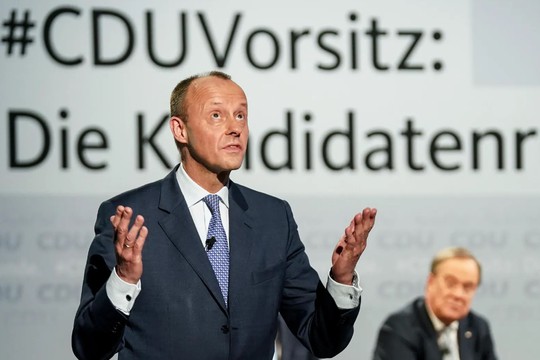Merz realized that politics is a complicated matter.
Photo: Getty Images
Incoming Chancellor Friedrich Merz is under growing pressure to win conservative policy concessions as coalition talks hit key stumbling blocks.
For Friedrich Merz, the hard part begins now, writes POLITICO.
The incoming conservative chancellor began coalition talks with the Social Democrats by giving them exactly what center-left parties have always wanted, reaching a landmark deal to unleash hundreds of billions of euros in new borrowing to bolster Germany’s military and infrastructure, including funds for green energy.
For Merz, long a preacher of fiscal discipline, the borrowing deal was a historic policy reversal — one that was easy for the Social Democratic Party (SPD) to endorse. But pressure is now growing on Merz from inside his own conservative alliance to secure traditional right-wing policy concessions in return, particularly on migration and cuts to welfare.
The problem for Merz, however, is that his fiscal flip has already given the SPD what it wanted most — meaning he has ceded much of his leverage in coalition negotiations.
Merz’s new vulnerability to attacks from his right flank is particularly problematic for a chancellor who has vowed to draw his Christian Democratic Union (CDU) to the right, offering what he sees as a correction to the centrism of his conservative predecessor, former Chancellor Angela Merkel. But his move to make a deal with the SPD and Greens on spending could be viewed as downright Merkelian.
Already, the far-right Alternative for Germany party (AfD) — set to become Germany’s biggest opposition party when the new Bundestag convenes — is trying to capitalize, portraying Merz as a closet leftist.
Merz is under pressure to deliver on his campaign promises, particularly when it comes to migration and cuts to social spending, which he suggested in a recent interview is one of the greatest sticking points.
The SPD has core disagreements with him in those areas — and little incentive to budge now that Merz has already given them their big wish on borrowing. For Merz, the other key problem is that due to the increasing power of radical parties on both sides of the political spectrum, he has no other viable coalition choice, since he has ruled out governing with the AfD.
That means he’s stuck with the SPD, whose leaders are keen to use that fact to their advantage, vowing to protecting social benefits and their core labor supporters.
What is emerging as an even bigger point of contention, however, is an issue that dominated the election campaign: migration.
Merz, in the weeks before the election, sounded increasingly tough on migration in order to win back voters who had moved to the AfD. The front-runner promised to introduce strict border controls on his first day in office and to reject all irregular entries, including asylum seekers.
The SPD argues that would violate EU law, anger neighboring countries and undermine European solidarity at a time when Germany needs the bloc to confront U.S. President Donald Trump on tariffs. Many in the SPD are also against a proposal to revoke German citizenship for people with a second nationality if they are found to hold extremist or antisemitic views, arguing the policy unfairly targets dual citizens. Philipp Türmer, the chairman of the SPD youth organization, referred to the proposal as an “absolute deal-breaker.”
The disagreements threaten to delay the formation of Germany’s coalition government amid already complicated talks, which involve 16 groups with 256 negotiators. After initially suggesting talks will be wrapped up by Easter, Merz has become less sure of that timeline.
“Thoroughness comes before speed,” he said last week. “The really difficult talks are still ahead.”
read more in our Telegram-channel https://t.me/The_International_Affairs

 11:10 26.03.2025 •
11:10 26.03.2025 •























